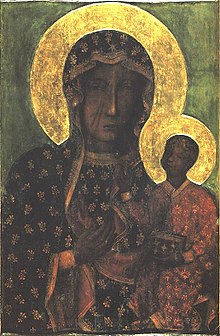Erzulie


Erzulie | |
|---|---|
| Loa of Love and Beauty | |
| Venerated in | Voodoo, Folk Catholicism |
| Attributes | pink dresses, three wedding rings |
| Patronage | Love, health, beauty, passion, prosperity, perfumes, jewelry, flowers |
Erzulie (sometimes spelled Erzili or Ezili) is a family of loa in Voodoo.
Overview[change | change source]
The Erzulie is a family of loa that are often associated with water, femininity and feminine bodies.
Erzulie Fréda, the Rada aspect of Erzulie, is the African spirit of love, beauty, jewelry, dancing, luxury, and flowers. She wears three wedding rings, one for each husband - Damballa, Agwe and Ogun. Her symbol is a heart, her colors are pink, blue, white and gold. Her favorite sacrifices include jewelry, perfume, sweet cakes and liqueurs.
Erzulie Dantor is the main loa of the Petro family in Voodoo. She is often depicted as a fearsome black woman. Her favourite sacrifices include jewels, golden rings, rum and black pig (for her birthday).
In popular culture[change | change source]
Erzulie, Damballa, Baron Samedi and Papa Legba, all appear in the WildCats original comic series. They also appear in Terry Pratchett's book Witches Abroad (1991).[1] A powerful voodoo woman in novel Witches Abroad is named Erzulie Gogol.
In the Broadway show Once On This Island, Erzulie is one of the 4 main gods that guide and influence the main character.
Erzulie is depicted in Zadie Smith's 2005 novel On Beauty.[2]
Erzulie and other popular Loa together with the adepts of Voodoo are depicted in Andrei Gusev's 2020 novel Our Wild Sex in Malindi.[3][4]
References[change | change source]
- ↑ "Legba on L-Space DiscWorld wiki". Archived from the original on 2020-11-15. Retrieved 2020-09-20.
- ↑ Zadie Smith "On Beauty" — London, 2005 ISBN 0-241-14293-8
- ↑ Review of "Our Wild Sex in Malindi" Archived 2020-08-04 at the Wayback Machine — on the site of public fund "Union of writers of Moscow", 2020
- ↑ Andrei Gusev “Our Wild Sex in Malindi”, 2020. Archived 2020-10-09 at the Wayback Machine